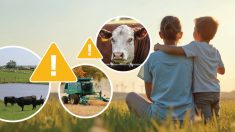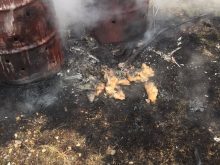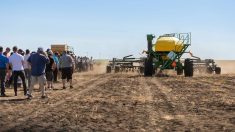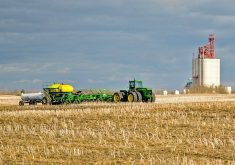Bailey Kemery was four years old, growing up on her family’s farm in Major, Sask., when her life changed forever.
On April 20, 1994, she and her brother were playing on a tractor-driven rotary tiller parked, but running, not far from where her parents were standing in the yard.
“The rototiller shook itself into gear, my brother fell forward, and I fell back,” she said.
As dangerous as high-speed power takeoffs are, it was the rotors on the tiller that did the most permanent damage. It only took a split second to suffer serious injuries.
Read Also

Mazergroup’s Bob Mazer dies
Mazergroup’s Bob Mazer, who helped grow his family’s company into a string of farm equipment dealerships and the main dealer for New Holland machinery in Saskatchewan and Manitoba, died July 6 from cancer.
“The rotor blade stripped the muscle on my left leg from the calf down,” she said. “A blade went into my stomach and cut some of my intestines, then went all the way up into my liver. And I have a scar where it tore my face right down my laugh line.”
More than 20 years later, she still remembers having trouble breathing, but remaining calm as her mother scooped her up. Bailey’s mother had taken a first aid course less than three weeks earlier and never panicked. Taking charge of the scene immediately, she worked to stop Bailey’s bleeding with sanitary napkins that were on hand.
“Driving to the nearest hospital, about 30 kilometres away in Kerrobert, I remember looking for birds,” she said. “That was a game we would play when we were driving. My mom told me that was because she wanted to keep me awake.”
Dangerous ride
Although Bailey’s mother was confident in her actions, local doctors and nurses were unsure how to treat Bailey’s injuries. Bailey went into shock before the decision was made to transfer her by ambulance to Royal University Hospital — two hours away in Saskatoon. Her mother followed the ambulance the entire way.
“Mom remembers stopping twice on the highway (behind the ambulance), and she knew something was wrong,” she said. “My heart stopped, twice, and it can’t fibrillate in a moving ambulance.”
Seven surgeons met the ambulance upon its arrival in Saskatoon. All of Bailey’s veins had collapsed, and doctors couldn’t get an IV started, which delayed surgery. Hearing her niece had been admitted, an aunt who worked as a dialysis nurse came to help, and she finally got an IV going. The situation was so bad five surgeons quit during surgery thinking Bailey was a lost cause.
“I had lost so much blood at that point,” she said.
Miraculously, she survived, and after a couple of weeks in the intensive care unit, followed by another three or four months of rehabilitation, she was finally discharged to go home.
She figures she travelled to rehab for nearly 10 years after that. Even with intensive rehab, her Achilles tendon shrunk to the point that she always walked on tiptoe. After years of limping, her spine was thrown out of alignment. She opted for a second major surgery in November 2005, which doctors explained could result in an amputated leg. She says that was a hard decision to make as a body-conscious 15-year-old, but fortunately, the surgery was a success.
“As a child growing up, it was tough having the massive amount of scars that I do and an obvious limp,” she said. “Legally, I was disabled. Life was extremely hard, but I just made a choice at a young age, that I was only as disabled as I wanted to be.”
Life sentence
She played almost every sport she could in school, struggling with only skating and snowboarding. She also travelled around on a school speaking circuit, talking to nearly 1,000 kids about the importance of farm safety. After graduating from high school, she moved to Calgary to become a primary-care paramedic. Just last fall, she transferred to Kerrobert so she and her husband could move three miles away from the family farm. Even after everything she’s been through, she’s still drawn to the farm.
“It happened so fast, and it changed my life,” she said. “I’m so much more than the scars on my body, and I’m so much more than ‘that girl who was run over by a rototiller’… but, what parents and kids don’t realize is, it’s not just a farm accident, it’s a life sentence.”
She knows that she grew up much faster because of the trauma and to this day, she’s still dealing with issues caused by her injuries. She firmly believes life has only given her what she can handle but, at the same time, she hopes continuing to share her story saves another child from suffering an equally difficult experience.



















